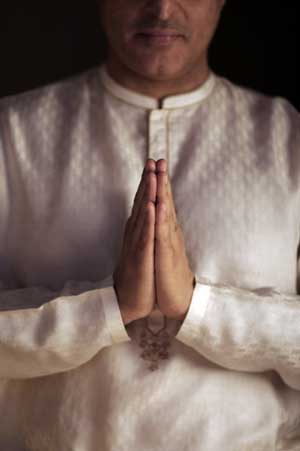
Definition of Pranam Namaste - Hindu Tradition & Ritual
Pranam(Namaste) is the joining of palms and bowing of head in reverence and submission to God. It is also offered in recognition that God is supreme, and the refuge and protector of all. The faithful utter God's name and pray, seeking his grace and blessings for peace and happiness. Pranam is also a traditional gesture for greeting and offering respect to guest and seniors.
Namaste meaning
Namaste or namaskar is the Indian way of greeting each other. Namaste and its common variants namaskar, namaskaara or namaskaram, is one of the five forms of formal traditional greeting mentioned in the Vedas.
Offering Pranam soothes and rejuvenates the body and mind. The feeling and intensity of repect and humility lingers and grows when practiced as daily ritual.
A Hindu expresses reverence to God by joining the palms and bowing the head. This ritual is called Pranam. It is also a gesture of greeting guests, showing respect to seniors and parting farewell to friends, relatives and others.
The essence of Pranam is obeisance to God. Devotees bows to God with humility and submission-Prantipat. The palm held together by the heart and the bowed head convey deep reverence born from the heart and absolute submission of mind respectively.
God, as the creator, sustainer and destroyer, possesses infinite powers. Pranam is gesture of appreciation of his greatness and glory. It is also in recognition from the deep recesses of one's mind and soul that God is supreme, and the refuge and protector of all. Therefore, by offering Pranam, one offer respects and seeks his grace and blessings for happiness in this world and beyond.
The other gestures of reverence to the Divine are Dandvat and Pradakshina. Prostrating and touching the eight specified parts of the body to the floor is called Shastang Dandvat Pranam, and circumambulating the deity is called Pradakshina.
The ritual of Pranam is accompanied by a personal prayer to God. Offering Pranam soothes and rejuvenates the body and mind. The feeling and intensity of respect and humility lingers and grows with daily practice.